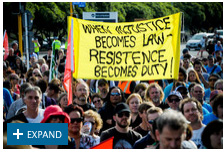double-speak explained
At present we are witnessing the wharfies at the Port of Auckland in a bitter fight against casualisation of their jobs.
The National Government term for "casualisation" is "flexible" - they put a spin on the concept making out that it will benefit the workers, when in fact this is the thin end of the casualisation wedge - what it will mean is that this system will give the employer the right to tell people when they can work. Workers will no longer be assured of a 40-hour a week job.
This in the NZ Herald today....you gotta admire the spin the Nats put on it - but it's bullshit no matter which way you read it.
"A law allowing some workers the right to request flexible working hours is to be extended to all employees.
The Employment Relations (Flexible Working Arrangements) Amendment Act, which came into force in 2008, gave employees who also had caregiving responsibilities the right to request flexible working arrangements, including changes to their hours of work, days of work, or place of work.
The Government has signalled plans to extend the law, and a Department of Labour review presented to Parliament today supported that move.
Labour Minister Kate Wilkinson said the review found flexibility delivered positive business benefits, including improved retention and recruitment of staff, and improved employee motivation and loyalty.
"At present the right to request flexible working arrangements is only available to employees who are caregivers. We will be extending this right to all workers which should improve work-life balance, benefit the community and boost productivity in the workplace," she said.
"This change to the Act allows employees to reach agreements that both they and their employers are happy with.
It's about trusting them to reach agreement first without having to go through a formal process."
Ms Wilkinson said the changes to the current law were likely to come into effect later this year.
The review also found there were some groups of workers who currently had little or no access to flexible work due to both perceived and real barriers, including limited bargaining power, workplace culture, and operational constraints within some workplaces.
"These workers are more likely to be low-income employees, employees with no qualifications, and Pacific workers," the review said.
It recommended that if the law was extended to all employees, it should be accompanied by awareness-raising measures among employers and employees about the benefits of flexible work."
The National Government term for "casualisation" is "flexible" - they put a spin on the concept making out that it will benefit the workers, when in fact this is the thin end of the casualisation wedge - what it will mean is that this system will give the employer the right to tell people when they can work. Workers will no longer be assured of a 40-hour a week job.
This in the NZ Herald today....you gotta admire the spin the Nats put on it - but it's bullshit no matter which way you read it.
"A law allowing some workers the right to request flexible working hours is to be extended to all employees.
The Employment Relations (Flexible Working Arrangements) Amendment Act, which came into force in 2008, gave employees who also had caregiving responsibilities the right to request flexible working arrangements, including changes to their hours of work, days of work, or place of work.
The Government has signalled plans to extend the law, and a Department of Labour review presented to Parliament today supported that move.
Labour Minister Kate Wilkinson said the review found flexibility delivered positive business benefits, including improved retention and recruitment of staff, and improved employee motivation and loyalty.
"At present the right to request flexible working arrangements is only available to employees who are caregivers. We will be extending this right to all workers which should improve work-life balance, benefit the community and boost productivity in the workplace," she said.
"This change to the Act allows employees to reach agreements that both they and their employers are happy with.
Ms Wilkinson said the changes to the current law were likely to come into effect later this year.
The review also found there were some groups of workers who currently had little or no access to flexible work due to both perceived and real barriers, including limited bargaining power, workplace culture, and operational constraints within some workplaces.
"These workers are more likely to be low-income employees, employees with no qualifications, and Pacific workers," the review said.
It recommended that if the law was extended to all employees, it should be accompanied by awareness-raising measures among employers and employees about the benefits of flexible work."




Comments